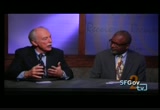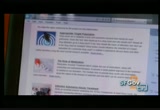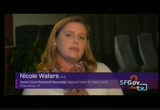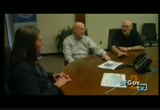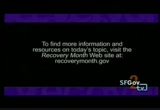tv [untitled] November 29, 2012 8:30am-9:00am PST
8:30 am
tom, in your view, what would the ideal scenario be in terms of what the aca brings forward and the special between the system, the healthcare system and the specialty care? should they all be available? yes, as far as i'm concerned, the stage is set for a true revolution in the way behavioral disorders, behavioral healthcare problems are addressed. i don't think there's anything in my lifetime that's got more promise than the combination of parity and aca. imagine if we had purchased coverage for diabetes the way we've purchased coverage for addiction. the only people who would get diabetes care in this country are people who would have gone blind or lost one of their fingers because that's the only kind of coverage we've ever had. you had to be at the most severe end of the spectrum in
8:31 am
order to even get care, and that care was segregated from the rest of healthcare. you've heard many times about the other problems that are associated. well, they're literally paid for separately with a workforce that's trained differently. now, as healthcare reform and parity roll out, people at all parts of that continuum ought to be able to get care from being screened early, as candace says, through interventions in the office of their primary care doctors to specialty care that they already have and beyond. i think it's going to be really quite an important benefit for people that are affected, but for the rest of medicine as well, going to see better quality care and far-reduced costs. and you've brought in a very good dimension in terms of how we train individuals. obviously, if we're looking for more people to adopt evidence-based practices, right, dr. laudet?
8:32 am
wouldn't we really pay attention to how we're training the new people so that to make sure that they really have all the tools that are available in order for them to begin a new practice or in order for them to be begin a new inclusion into a healthcare system of the mental health and the addiction treatment methodologies? that's-you make a very good point, and there's two issues there. there's the fact that within behavioral health care, historically, social workers, for example, and mental health professionals had very different thinking paradigms, different ways of approaching the disorder, and so we need an integration at that level. we also need an integration, and tom has done some nice, interesting work about that or looked at that. primary care physicians have to be made aware of the fact that
8:33 am
the folks who come into their practice may have other problems. for example, i'm looking at some data that i have from a nida-funded study, people in recovery, and, of course, they all have a history of chronic substance use problem, because that's how they ended up in the study. in addition to that, over 50 percent of them have a chronic physical condition, 72 percent of whom have more than one. so they have multiple physical care condition. over a third of them also have a mental health condition, and the co-occurrence of these, when you look at, for example, the odds of developing one or more chronic physical condition as a function of having a mental health diagnosis, is two to three times across samples. so, people come in treatment, whether it's substance use treatment or mental health treatment or primary care treatment, they're one person with a whole lot of problems. and all of the providers who are professionally in
8:34 am
a situation where they're likely to encounter and be called upon to treat these individuals have to be at least more than peripherally aware of the fact that this is going on, and currently in the training this is not happening. and there's also a hierarchy of diseases, if i may, where a person treating someone with diabetes or any chronic condition has a behavioral component. so it's fair to say that even someone with diabetes, the behavior may not be stigmatized, but they may be eating too much, you know, so -but that's not as stigmatized as doing drugs. the other thing that i would add, if i may, is that for people with other chronic conditions-asthma, hypertension, diabetes, what have you-if there is also an existing condition that's a mental health concern or a substance use disorder, untreated, those behaviors affect the successful treatment
8:35 am
of the diabetes or what have you because of compliance to medications, lifestyle changes, whatever. so, i would add that. the other thing i would want to add is that in the screening brief intervention referral to treatment area, grants that samhsa gave to the states for demonstration of sbirt, in wisconsin, we elected to do that in primary healthcare settings. and, just a couple of barriers that i want to mention, in terms of really implementing that into primary healthcare settings, one is that primary care physicians simply do not have the time themselves, we found. they see patients for a very short period of time. they deal with an average of seven problems during that short period of time, and to take the time to really talk with somebody and screen them about substance use is very, very difficult.
8:36 am
so, it would require, i think, probably the type of shift in the training that we spoke about earlier. dr. clark, i want to move on to what is samhsa currently doing in terms of workforce development to really begin to get practitioners to understand and to adopt evidence-based practices? well, as was mentioned, we are working with organized medicine through our sbirt efforts, through our attcs. we also have a medical residency component of our screening brief intervention referrals or treatment strategy, but we are also working with our colleagues at hersa and the nih and ondcp, so that we can diffuse that information. it is key to recognize that recovery, as it were, or a public health approach to behavioral health requires
8:37 am
a broader overview, not just, as tom pointed out, not just specialty care. it is the full spectrum of care because some problems are just risky problems. the person was drinking three drinks and has minor problems. if we don't address that, then when we-we wait long enough, they'll go from three drinks and minor problems to six drinks and major problems at a single setting. so what you want is this integrated recognition and the differentiation of, okay, well, how do we intervene at specific points, and that notion of staged intervention has been raised, and it's an important one. not everybody needs the same intervention at the same point in time. so, what we're promoting is education at all levels, counselors, social workers, psychologists, psychiatrists, working with organized medicine, organized social work,
8:38 am
organized psychology, using strategies to help educate existing professionals because, remember, the overwhelming number of existing professionals exceed those who are in training. so you have to deal with those people who are in training as well as those people who are in existing practice. one of-my nephew graduated from college and i was attending his graduation and his sister's in medical school, and she's going to become an anesthesiologist, and she was-we were talking about drinking. she says, i know, i know. i have to ask should we cut down? do i get angry? so, she was reciting the cage to me, and she's graduating from medical school. so, we are obviously having an impact, at least at some places where people are sensitive, but our question is what do i do with the information? exactly. i could add, i want to commend samhsa on something that i don't see being done anywhere else in medicine, and that is using peers, and there are other places in medicine
8:39 am
that are seeking to educate the family. the fact is this country can't afford the kind of money that it's spending on health care. families, particularly parents and peers, can be a real important part of the support services that prevents relapses and engages people in treatment. the substance abuse field, and i have to say samhsa, has been really a leader in developing that and it's-i think it's going to be a real service to the substance abuse field, but i think it's going to be a big service to medicine generally. when we come back, i want to continue to talk about some of the other initiatives that samhsa has, such as the attc network and everything else that we're doing to promote evidence-based practices. we'll be right back. [music]
8:40 am
recovery benefits everyone. i started my own company. i got my dad back. my friends believe in me. daddy's home. hi, dad. substance use and mental disorders can be treated. it all starts on day one. join the voices for recovery. for information and treatment referral for you or someone you love, call 1-800-662-help. brought to you by the u.s. department of health and human services. [music]
8:41 am
the national center for state courts is a private, nonprofit corporation created to promote the rule of law and to work with the state courts in improving the administration of justice. to provide them with information that's going to be helpful to them. we first conduct research of issues that affect the administration of justice. hopefully, we develop some solutions. we pilot test those solutions, come up with best practices. different kind of scans of the brain. we have an educational arm that we use to produce training programs that we share what we've learned with the leaders in the court field. the translating drug court research into practice initiative is part of a general trend in recent years towards more and more emphasis on what does research have to say that can benefit the person who's on the ground? so instead of researchers talking to one another, they're really trying to take our research and make it
8:42 am
available to people in ways that could improve the job that they do. the r2p program is a cooperative agreement between the national institute of justice, the bureau of justice assistance, the office of criminal justice programs of the school of public affairs of american university and the national center for state courts. the purpose of the project is really to deliver the best research that's out there, including new and emerging research that will be relevant to the problems that the field is facing. so, we came up with the project of trying to develop ways to more timely and in a more interactive way share what has been learned, so that people can, as the name implies, move from the theory of the research to putting it into practical application. the r2p project tries to help people by condensing, through our efforts ahead of time, to distill really
8:43 am
what is the best evidence that's available that's relevant to the work of people who work in drug courts. so, we are then able to, by using experts and by preparing background information, to give people the very latest guidance on how they should do their work in order to promote effectiveness in what they are trying to accomplish. it's important to disseminate this information to the practitioners that are out there, so that they can understand better who's coming to the table, how do they relate to one another at the table, and how can they make the most effective decisions. understanding that type of research, i think, is really valuable. it's not only important in translating research into practice but also translating in a way that can draw on the experience of practitioners that have tried to use research findings and what are the barriers that they find. trying to take advantage of quick turnaround and quick conveyance to mass audiences of information, but, at the
8:44 am
same time, allowing for the interactivity that will allow people to get a greater grasp of what's being said. the partners to this cooperative agreement that is r2p really get together and they try-we try to figure out what are the most important questions that people who work in drug courts have that we have evidence-based research that can be used to assist them. we then start thinking about what kind of resources should we put together, what kind of people should be involved as experts, and then what the format should be. the issue that we were trying to address when we crafted this project was that there's a great deal of good research that's gone on about drug courts and how they function and what's effective and what's not. but there's been a struggle to get that information out to the practitioners in a-first, in a timely way, and, secondly, in a way that is digestible, that it's usable, that is productive.
8:45 am
there's so little information that's relevant to actual services quickly available that i think that by making this information available to-in a very practical way-to everyone that's involved, but particularly to the criminal justice practitioner that doesn't normally have access to this, this will help strengthen these programs. dr. peterson, i want to go to you because you've mentioned some of the issues that the physicians are facing in terms of when they do their screening and so on, and you also mentioned off camera that you were attempting to work with them on motivational interviewing skills. you want to talk a little bit about that? yeah, and i'm speaking from my experience working with trying to implement sbirt into primary healthcare settings and emergency departments or emergency room settings in wisconsin. one of the things that was very difficult in terms of the implementation, one i mentioned earlier, that busy
8:46 am
physicians, it's very difficult for them to find time. the very brief screening itself, however, you can do universally to everybody who walks in the office in a very short period of time. pencil and paper are up on a kiosk. that will give you enough information to know what to do with that person next. that, in itself, doesn't take the time, but talking to patients does. in wisconsin, we used paraprofessionals that we trained very intensively to work with people, and that was very effective. they took the time. they were very skilled in motivational approaches, and the thing that was also difficult is that there's a lot of stigma around both mental health issues and substance abuse. this affects not only the individual, but it also affects
8:47 am
everybody else who grew up in our society, including providers. in wisconsin, some providers were very reluctant to bring up the subject of somebody's alcohol use with them. they felt it was intrusive, and i think this idea of stigma is really critical for us to address. as long as that is in play as strongly as it is right now, it's going to be a major obstacle for us in getting people to agree to treatment, in getting physicians or other health professionals to discuss behavioral health with their patients, and it's something that we really have to take a look at. well, i tend to be an optimist, so i'm going to say that once people watch the show and learn that there are other resources
8:48 am
out there that they can learn from that we will begin to change a little bit some of the minds that need to be changed. tom. i'd like to comment, because i'm-have the advantage of being old, and i've heard this stigma argument for a very long time, and it keeps going on, and the kind of behaviors you describe, candice, just keep happening. i am not sure that educating physicians and nurses and pharmacists about addiction is the way to go. i think when they understand just how profoundly even subdiagnostic levels of alcohol and other drug use affect the rest of the conditions that they're trying to treat and how they've been ignoring that to their own peril. they're not treating the diabetic, the asthmatic, the hypertensive patient in a professional or comprehensive way if they haven't even asked about their alcohol and other drug use. i think that's the kind of thing that's going
8:49 am
to make stigma go away. and, how do we do that? you show them that it is in their interest, and dr. clark correctly said this is our chance to show real value to the rest of medicine. if we can show improved outcomes in general health by showing that when you do it with the kind of innovative programs that candice is talking about you get better cost savings, you get better access, you get better adherence to treatment, now, you've got something. i would add to what tom is saying is it's not only a matter of-although critical-not only a matter of helping physicians and other healthcare professionals see that they are going to get better outcomes, in the long run, it's going to be more cost effective. yes. absolutely. but it's also a matter of really helping people understand on a very deep level that addiction is not about a failure of the will.
8:50 am
it's a brain disease, and it must be treated as a medical condition on parity with other kinds of chronic conditions. i think that really plays into stigma when people do not see it as a- absolutely. and, dr. clark, i want to go back and, as we're offering the audience a sense of where they can look for information and for training materials, talk a little bit to us about the addiction technology transfer centers and the wealth of information that they can provide. well, our addiction technology transfer centers work with community providers, state authorities, tribes and peers, so that they would have access to information. so, you go to our web site and you can find information about a wide range of strategies and issues. and the theme that keeps surfacing here is that as behavioral health is part of health, you can't deal with
8:51 am
health without dealing with behavioral health, and our attcs help get that information. we also have what's called our national registries of effective critical practice or nrep, which allows people to identify clinical strategies that have been shown to work for a wide variety of populations. and so they can go to samhsa's web site and look up nrep and see what kind of clinical strategies are being employed. so our link with the nih is an essential one. we have a blending initiative with the national institute of drug abuse where we're promoting effective evidence-based practices, and training materials are available, so that providers and consumers can get that information. we want to make sure that consumers, peers, families, as well as providers and policymakers are aware of the wide range of information because, at the end of the day, stigma and discrimination and the expectation of
8:52 am
individuals with regard to mental health and addiction is a cultural phenomenon. when we look at the people who are not engaged in substance abuse treatment, 95 percent perceive no need for treatment. even though they meet criteria for abuse or dependence, they perceive no need. it's not that they don't want treatment. it's that they perceive no need for treatment. and that is the conundrum for the healthcare delivery system. if we don't facilitate that awareness at the community level, at the family level, at the employer level and at the provider level, , then we'e always going to be dealing with the extremes of these conditions and people will not recognize that they need to change their behavior early. and as dr. laudet pointed out and dr. peterson pointed out, if the individual has diabetes and doesn't take his or her medication, hypertension doesn't take medication, cardiac disease doesn't take medication because of alcohol or drugs or anxiety
8:53 am
or depression, then we're not going to effectively intervene with those conditions. so, behavioral health is a part of health. prevention works. treatment is effective. we just need to make sure that all of our efforts are synergized, so that we get that message out. if i may add to what dr. clark just said in terms of the so-called denial gap of the 92 percent people who need services and don't feel the need, i think that part of that may be the stigma because, i mean, as human beings i think we don't like to consider the fact that we're not in charge of stuff. so, generally, people are being blamed. i mean, people, now, are almost blamed for their diabetes and their health style-you're not exercising. you know, if you're eating wrong or you're smoking, and, you know. so, the more we're giving people information in terms of the behaviors which they have some power to alter in order to improve their health-at the same time, we're kind of blaming them
8:54 am
for not taking care of it if they're not. so, historically, even though the public seems to be increasingly buying into the addiction is a disease concept, most people, i think, in the back of their mind, thinks it's a moral weakness. so, that's what underlies the stigma. and who's going to want to cop to the fact that they may have a stigmatized problem and they've been doing bad things? if we were really able to make the same move we've had with, say, cancer, which, when i was a child, if somebody had cancer, you whispered it, and it was like a death sentence, but, now, people are walking down the street with ribbons and walking and giving money and it's a triumph to be- well, it has been a public movement. and it has been somewhat destigmatized, as has, to some smaller extent mental health issues. you've had celebrity people or politicians' wives or even politicians, especially once they're out of office, sometimes coming out and saying, i've been treating-usually, they're not coming out saying, i'm being treated for depression now, but they are saying, i have been treated for depression in the
8:55 am
past, which kind of, you know, opens the dialogue- humanizes it. -but also kind of gets away from the fact that they're okay now. and, there's a whole host of other issues we could have touched on related to research to practice, but before the end of the show, i want to remind our audience of national recovery month celebrated every september. you can get more information at our web site. thank you for being here. it was a great panel. for a copy of this program or other programs in the road to recovery series, call samhsa at 1-800-662-help or order online at recoverymonth.gov and click multimedia. every september, national recovery month provides an opportunity for communities like yours to raise awareness of substance use and mental health problems to highlight
8:56 am
the effectiveness of treatment and that people can and do recover. in order to help you plan event and activities in commemoration of this year's recovery month observance, the free recovery month kit offers ideas, materials, and tools for planning, organizing, and realizing an event or outreach campaign that matches your goals and resources. to obtain your copy of this year's recovery month kit and gain access to other free publications and materials related to recovery issues, visit the recovery month web site at www.recoverymonth.gov or call 1-800-662-help. [music]
100 Views
IN COLLECTIONS
SFGTV2: San Francisco Government Television Television Archive
Television Archive  Television Archive News Search Service
Television Archive News Search Service 
Uploaded by TV Archive on

 Live Music Archive
Live Music Archive Librivox Free Audio
Librivox Free Audio Metropolitan Museum
Metropolitan Museum Cleveland Museum of Art
Cleveland Museum of Art Internet Arcade
Internet Arcade Console Living Room
Console Living Room Books to Borrow
Books to Borrow Open Library
Open Library TV News
TV News Understanding 9/11
Understanding 9/11








